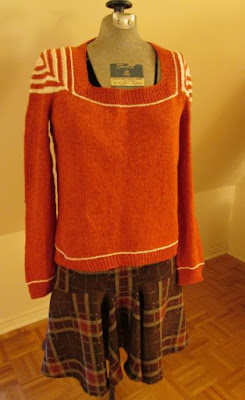Thursday, October 6, 2016
From Bowknot to Stripes
This project plan began when it became necessary to reknit an existing sweater.
Back in 2010, I knitted myself a Schiaparelli Bowknot sweater from the iconic 1920s pattern out of Elsebeth Lavold Silky Wool in burnt orange, and Sublime Yarns Cashmere Merino Silk DK. Then, because the sweater didn't seem to go with anything I had in my wardrobe, over the course of the spring and summer of 2015 I made a skirt in a material and a style specifically selected to go with the sweater. And then, just when I'd finally gotten a whole outfit together, what happened? Moths happened. And they, or more accurately their larvae, ate about four holes in my Schiaparelli Bowknot sweater.
I wasn't as upset as you might expect. I had been considering redoing the sweater anyway, and it was almost a relief to have the matter decided for me. The fact was that I had never really been satisfied with my Schiaparelli Bowknot sweater because the twenties-era lines of this sweater were too shapeless and unfinished-looking to suit my figure or my taste. Years ago I used to think I loved 1920s fashions, but when I did some reading up on it and paged through actual twenties designs, I discovered that what I had actually loved was our contemporary costume designers's recreations of twenties clothing, and that actual 1920s clothing looks shapeless and unflattering. And as I continued looking through books on twentieth century fashions, I discovered that it was the 1930s, with its beautifully shaped classic clothing and clever detailing, that was my favourite fashion decade. I've made two sweaters from vintage 1930s patterns that I am thrilled with because they have both great shaping and great style, and I just didn't feel the same way about my bowknot sweater. With only four holes, the yarn I had used to make my Schiaparelli Bowknot sweater was worth reknitting, but I definitely didn't want to reuse the same pattern for the reknit, and I turned to Ravelry to find a new look for the yarn.
After some searching to find a pattern that called for two colours of fingering yarn in the amount I had, I settled on this design, which is the Amande Tee, designed by Atelier Alfa. It's a contemporary pattern, but I thought it had a certain 1930s vibe to it. Knitwear of the 1930s often did have Art Deco-inspired artful stripes. The construction was unusual. One begins by knitting each shoulder patch from the centre out, and once the two patches are complete, picking up and casting on more stitches for the front and back until one is knitting the body in the round. It was a bit of a challenge to make this sweater, but a worthwhile one.
And here's my completed version of the Amande Tee. I am much happier with this sweater than I was with its former reincarnation. It has a far more polished and flattering shape and looks much more current, and it's visually striking. And, of course, it is entirely moth-hole-free.
Subscribe to:
Comments (Atom)



